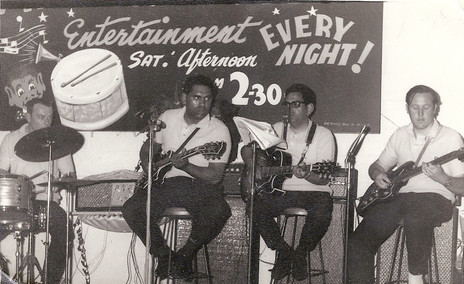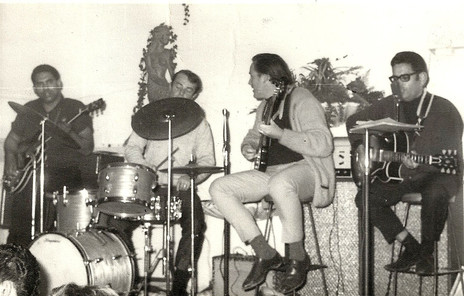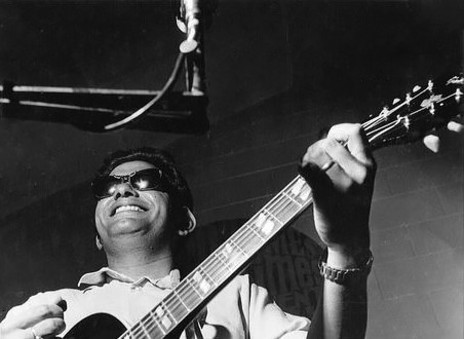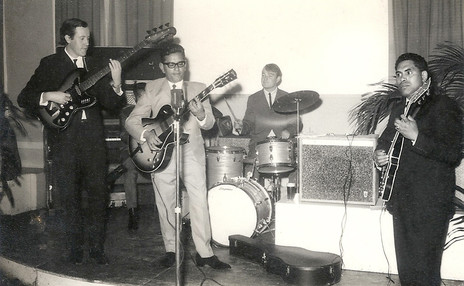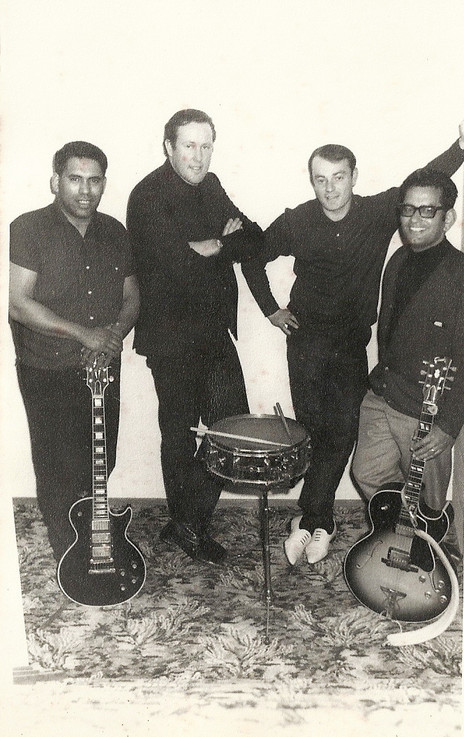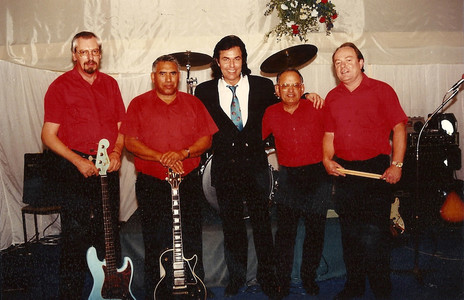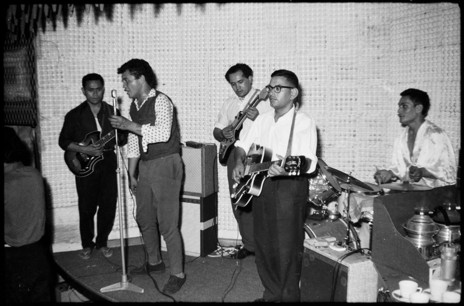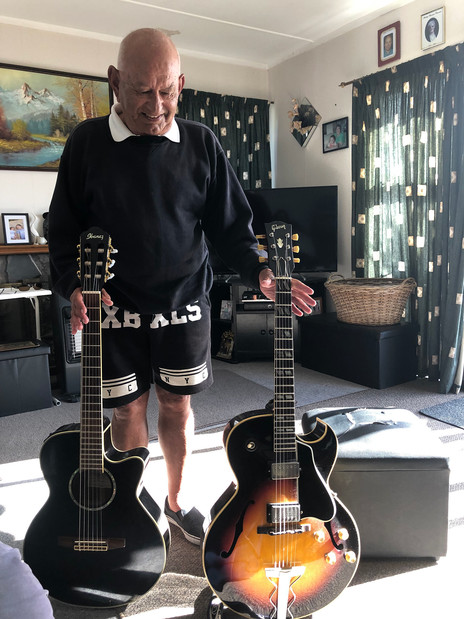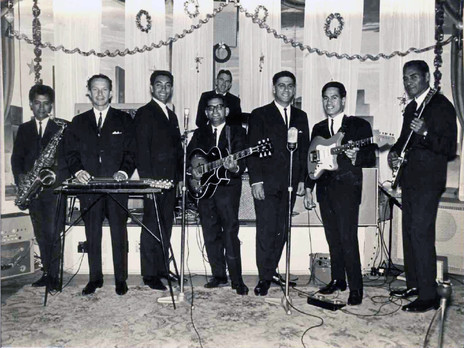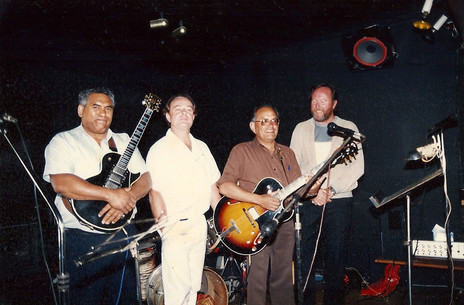When he was six, in 1943, Buddy contracted tuberculosis of the spine and spent the following six years of his childhood in Whakatāne Hospital. He remembers the end of the World War II and watching the nurses dance up and down the ward. Gerry Merito, who had TB of the hip, was in the ward with Buddy and the two boys formed a close friendship. (Merito was also from Tāneatua.)
Buddy contracted tuberculosis of the spine and spent six years of his childhood in Whakatāne Hospital.
Gerry could already play the guitar, and taught Buddy chords; when they could, they would play for the other children on the ward. Most of the time however, Gerry and Buddy were confined to their beds because they were in plaster casts to keep them immobile. Gerry’s cast was around his hip and leg, Buddy’s around his spine and neck. Every two months the casts would be removed giving the boys time to stretch their muscles and, as Buddy says, “be a general nuisance”.
In 1950 both boys benefitted from Dr Park’s new technology that saw them wearing leather frames that enabled them to walk and therefore return home. Buddy was finally discharged in 1950 and allowed to attend school at Tāneatua Primary School.
Although he had never owned a guitar, Buddy had a ukulele and, because he was a fan of Benny Goodman, his father bought him a clarinet. Buddy played the clarinet with local dance bands while he was still a student at Whakatāne High School.
When he went on to Ardmore Teachers’ College in 1957 to train as a primary school teacher, Buddy was in two singing groups. The first was a group called the Sasmos in which Buddy played a guitar loaned to him by a friend. They were all teachers’ college students and mostly Māori, with one Fijian. They were led by Lou Clauson of Lou and Simon fame, a Pakeha who at that time owned a milk bar in Papakura and would get them gigs around the area.
In 1958, they started another group called the Starlighters, this time all Māori. Many of the previous group had left training college to go teaching, so the band had to start afresh and again Buddy played a guitar belonging to a friend. At the end of 1958, at the completion of their training, Buddy turned 21 and for his 21st, the band members got together and bought Buddy his first guitar, a Hofner.
Buddy’s first year of teaching in 1959 was in the mill town of Kawerau at Kawerau North School in the eastern Bay of Plenty. Buddy’s guitar playing ability formed a big part of his teaching as the children, including future New Zealand icon John Rowles, responded well to a teacher who could play guitar and knew all the latest tunes that were being played on the radio.
In Kawerau, Buddy started a band called The Rebels with some local musicians who pooled their money and bought their first amps. Buddy put pickups on his Hofner but they weren’t a great fit so he traded the Hofner for a Maton electric, which he played for the next four years he spent working in Kawerau.
A teaching job in Panmure followed and, one day in 1963, Buddy found himself at Eady’s Music Shop in Queen Street where he spotted a Gibson that he traded for his Maton on the spot. It cost £176 at the time and is still a permanent fixture in his life today.
In 1965 he had a stint with Bill Sevesi at the Orange Ballroom where Bill and the MC ran very formal, strictly run gigs and the band wore sharp suits – sponsored and supplied by Cambridge Clothing of New Lynn. Sevesi was a firm bandleader and all the tunes were programmed; the tempo was all important and he instructed his band to play music that suited the atmosphere and the dances.
BUDDY’S GIBSON GUITAR COST HIM COST £176 IN 1963 AND IS STILL A PERMANENT FIXTURE IN HIS LIFE TODAY.
Other bands and individuals Buddy played with included Terry Dean and the Nitebeats, Peter Posa, the Yandall Sisters and Gray Bartlett.As well as teaching, Buddy played in several bands and nightclubs in Auckland and his career intersected with many well-known New Zealand musical identities from the 1960s to the 2000s. One of his early gigs in Auckland was with Joe Rickit’s band at a strip club called the Bel Air on Queen Street.
Around 1964/65 Buddy got together with Ben Tawhiti (Ngāi Te Rangi) and together they gigged around the city until 10 o’clock closing was introduced in 1967. On the day late closing officially started, they auditioned at the Milford Marina Hotel and were hired straight away. The audition was just to the publican Bert Mackie and his wife, as the staff were on strike for more pay because of the later hours.
As the Mariners Showband they stayed at Milford for four years, sometimes playing seven nights a week. The Mariners consisted of Ben, Buddy, Keith McIntyre on bass and Alex Behrens on drums, later joined by Marsh Cook on saxophone. The band played not only rock and roll, but blues, jazz, Latin, Hawaiian and more, which according to Buddy was due to Ben’s amazing repertoire.
In the first three years of pub playing, there was no dancing allowed, so the band had to be versatile and able to entertain as well as play good music. The band certainly succeeded at that, as the bar was often packed six-deep on Fridays and Saturdays. Charlie Bancroft owned both the Milford Marina Hotel and the Thunderbird Valley Inn in Glenfield and he booked the Mariners for six weeks when it first opened. When that gig ended the band went back to the Milford Marina and the very talented Impressions took over at the Thunderbird.
In the meantime, Buddy had kept his day job and stayed at Panmure Primary School for seven years. He married, raised three daughters, built a house on the North Shore where he still lives today, and became deputy principal at Northcote Primary School.
In 1989, Prime Minister David Lange abolished the Education Department and formed the Ministry of Education. It meant the demise of the school inspectors and gave power to school communities in the form of boards of trustees, and the ministry had to hire completely new staff because of the new roles it had to fulfill. Buddy was approached by one of the recruitment officers looking for Māori who had teaching experience and could adapt to the needs of the contemporary educational environment.
As a liaison officer Buddy’s role was to work with the licensing of Kōhanga Reo, from Meremere in the Waikato to Cape Reinga in the far north. This meant a lot of time on the road and work with Māori communities in setting up Kura Kaupapa Māori and providing their funding. Since te reo Māori was going to be a big part of the job, Buddy worked to improve his grasp of the language and started with the ministry in 1990.
Meanwhile, after the Mariners disbanded, Ben and Buddy did the odd gig as a duo. Buddy also performed in Ben’s band Ngā Kaumātua for Hinewehi Mohi’s series Maumahara which screened on Māori TV in 2007 (Raukatauri Productions). Not long after, Ben’s health began to deteriorate and he stopped playing altogether. His passing in 2012 saw Buddy hanging up his guitar as well.
Buddy finished our email conversation with this:
“As I sit here writing this, my two guitars – the Gibson and an Ibanez acoustic – are on their stands right alongside me (the acoustic was presented to me by all the staff at the Ministry of Education when I turned 65 and announced my retirement). When I’m not jamming with my young grandson, I have pre-recorded backing tracks on my computer, so when I get bored, I pick up either one and reminisce.”
